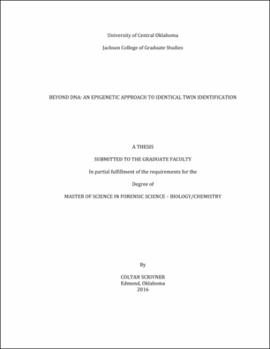| dc.contributor.advisor | Adams, Dwight | |
| dc.contributor.author | Scrivner, Coltan | |
| dc.date.accessioned | 2020-07-09T14:38:51Z | |
| dc.date.available | 2020-07-09T14:38:51Z | |
| dc.date.issued | 2016 | |
| dc.identifier.other | (AlmaMMSId)9982476584502196 | |
| dc.identifier.uri | https://hdl.handle.net/11244/324993 | |
| dc.description.abstract | For more than two decades, DNA analysis has helped forensic scientists link suspects to a crime. Often times, DNA evidence is one of the most impactful pieces of evidence available. However, there is still one thing that traditional DNA analysis cannot accomplish - differentiating DNA from identical twins. With identical twins becoming more common than in the past and with numerous examples of cases being dropped because an identical twin was implicated, it would benefit the forensic science community to find a solution to this problem. The goal of this project was to see if the conventional forensic science techniques of cycle sequencing and capillary electrophoresis could be used to distinguish twins via DNA methylation analysis. It was found that the use of cycle sequencing and capillary electrophoresis for the analysis of DNA methylation extracted from human cells was problematic. While small successes were achieved in analyzing the methylation, the results were not consistent. Thus, while cycle sequencing and capillary electrophoresis are convenient and cost efficient for the forensic science community, they may not the best instruments for this problem. The PRKCA locus was shown to be a strong candidate locus that could be targeted by cycle sequencing or high-throughput sequencing technology. Therefore, rather than using an expensive and time-consuming method such as ultra-deep next generation sequencing to differentiate identical twins, the forensic science community should identify several key loci, such as the PRKCA gene analyzed in this study, for DNA methylation analysis. | |
| dc.rights | All rights reserved by the author, who has granted UCO Chambers Library the non-exclusive right to share this material in its online repositories. Contact UCO Chambers Library's Digital Initiatives Working Group at diwg@uco.edu for the permission policy on the use, reproduction or distribution of this material. | |
| dc.subject.lcsh | DNA fingerprinting | |
| dc.subject.lcsh | Twins | |
| dc.subject.lcsh | Epigenetics | |
| dc.title | Beyond DNA : an epigenetic approach to identical twin identification | |
| dc.type | Academic theses | |
| dc.contributor.committeeMember | Cassidy, Brandt | |
| dc.contributor.committeeMember | Creecy, James | |
| dc.thesis.degree | M.S., Forensic Science - Biology/Chemistry | |
| dc.subject.keywords | DNA Methylation | |
| dc.subject.keywords | Epigenetics | |
| dc.subject.keywords | Forensic science | |
| dc.subject.keywords | Twins | |
| dc.subject.keywords | Molecular biology | |
| dc.identifier.oclc | (OCoLC)ocn963867852 | |
| uco.group | UCO - Graduate Works and Theses::UCO - Theses | |
| thesis.degree.grantor | Jackson College of Graduate Studies. | |
